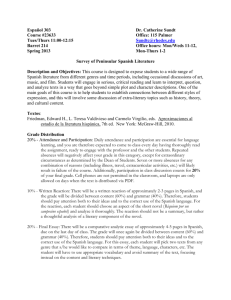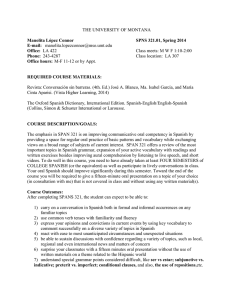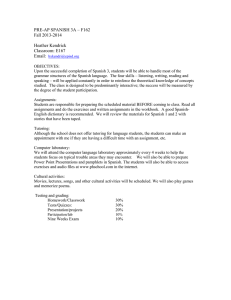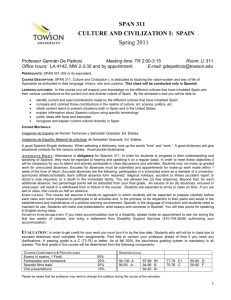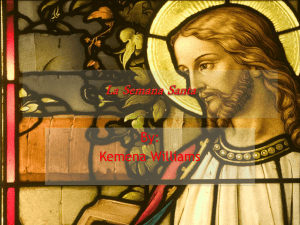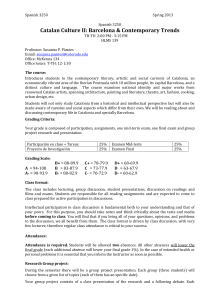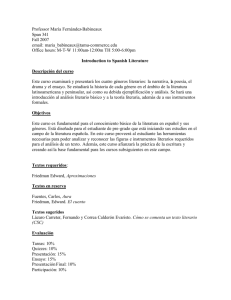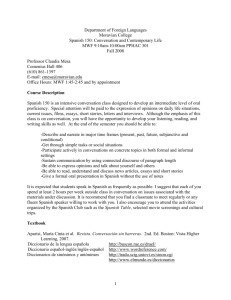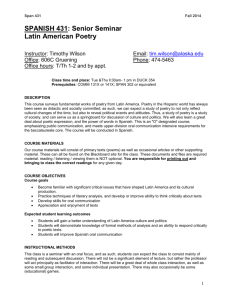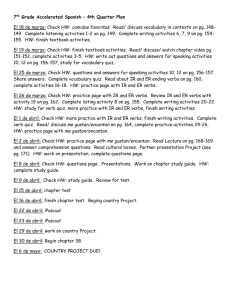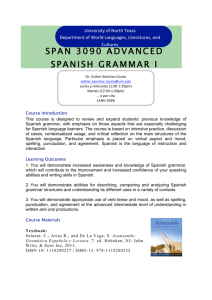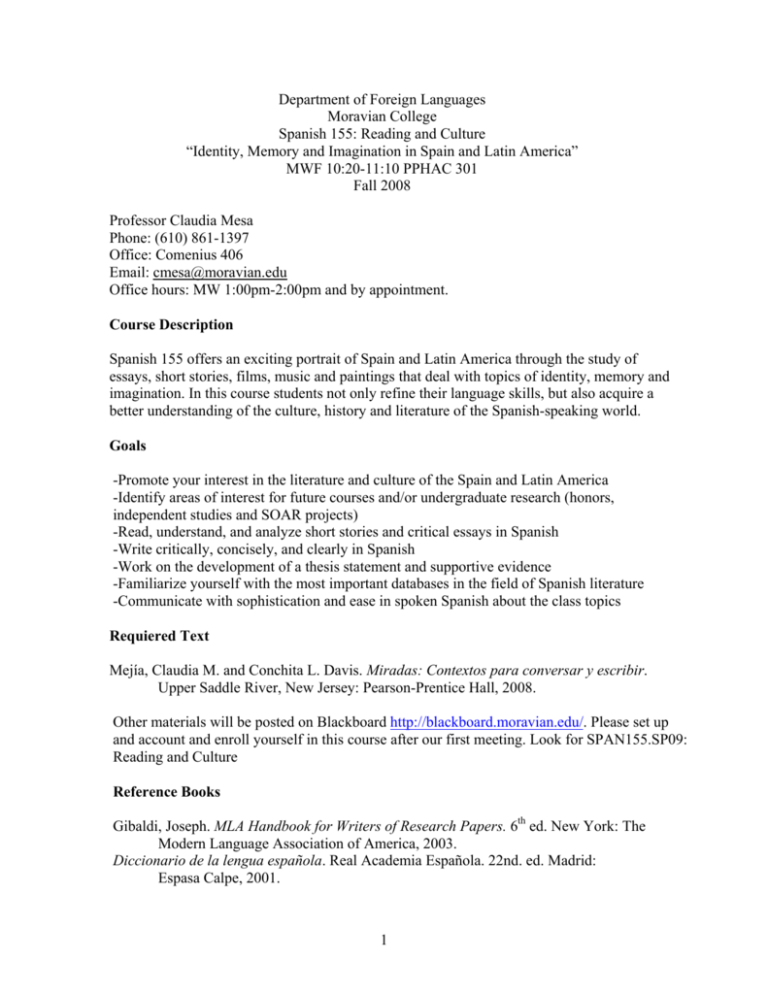
Department of Foreign Languages
Moravian College
Spanish 155: Reading and Culture
“Identity, Memory and Imagination in Spain and Latin America”
MWF 10:20-11:10 PPHAC 301
Fall 2008
Professor Claudia Mesa
Phone: (610) 861-1397
Office: Comenius 406
Email: cmesa@moravian.edu
Office hours: MW 1:00pm-2:00pm and by appointment.
Course Description
Spanish 155 offers an exciting portrait of Spain and Latin America through the study of
essays, short stories, films, music and paintings that deal with topics of identity, memory and
imagination. In this course students not only refine their language skills, but also acquire a
better understanding of the culture, history and literature of the Spanish-speaking world.
Goals
-Promote your interest in the literature and culture of the Spain and Latin America
-Identify areas of interest for future courses and/or undergraduate research (honors,
independent studies and SOAR projects)
-Read, understand, and analyze short stories and critical essays in Spanish
-Write critically, concisely, and clearly in Spanish
-Work on the development of a thesis statement and supportive evidence
-Familiarize yourself with the most important databases in the field of Spanish literature
-Communicate with sophistication and ease in spoken Spanish about the class topics
Requiered Text
Mejía, Claudia M. and Conchita L. Davis. Miradas: Contextos para conversar y escribir.
Upper Saddle River, New Jersey: Pearson-Prentice Hall, 2008.
Other materials will be posted on Blackboard http://blackboard.moravian.edu/. Please set up
and account and enroll yourself in this course after our first meeting. Look for SPAN155.SP09:
Reading and Culture
Reference Books
Gibaldi, Joseph. MLA Handbook for Writers of Research Papers. 6th ed. New York: The
Modern Language Association of America, 2003.
Diccionario de la lengua española. Real Academia Española. 22nd. ed. Madrid:
Espasa Calpe, 2001.
1
You can find a free online version at: http://buscon.rae.es/draeI/. Select: Búsqueda sin
signos diacríticos. If the word is a verb, you will be able to see all the conjugations.
Other Electronic Dictionaries:
Diccionario español-inglés/inglés-español
Diccionarios de sinónimos y antónimos
http://www.wordreference.com/
http://tradu.scig.uniovi.es/sinon.cgi
http://www.elmundo.es/diccionarios
* If you are student requiring learning assistance, I will be happy to accommodate you. I
recommend you contact Mr. Joseph Kempfer in the Office of Learning Services or Dr.
Ronald Kline from Student Counseling. Both can be reached at Ext. 1510. Also, feel free
to talk to me directly.
Course requirements and evaluation
1. Attendance
You need to come to class and be on time. 0-2 absences will not be penalized, but may
affect class performance. More than two absences will result in a lowering of the final
grade by one point for every additional absence. Please turn off your cell phone before
entering the class.
2. Papers
Students will write three short papers (2-3 pages) and one research paper based on a
primary source (a short story, a film, a poem). The paper must follow the MLA citation
style and format. The paper must be at least five pages long and should include a list of
works cited. Papers are due at the beginning of class and may not be sent via e-mail. Be
aware that content and grammar will be considered when grading these assignments.
3. Exams
There will be two exams during the semester.
4. Oral presentation
Each student will have the opportunity to prepare a lesson to the rest of the class on the
following dates:
Feb. 1
Feb. 16
Feb. 20
Feb. 25
March 9
March 11
March 18
March 25
March 30
April 15
Álvar Núñez Cabeza de Vaca y los tlacuilos
José Martí, héroe de la independencia cubana
Hernán Cortés y la conquista de México
La herencia africana en el Perú: Susana Baca, “Caracunde”
El gobierno de Salvador Allende y la dictadura de Pinochet en Chile
La dictadura militar argentina y las madres de la Plaza de Mayo
La Revolución Sandinista en Nicaragua
El subcomandante Marcos y el EZLN en Chiapas
La inmigración en España
La Revolución cubana y el estado actual de Cuba
2
5. Homework
Homework will include a variety of readings and exercises such as short response
journals, debate preparation, and thesis development activities. I will collect homework at
least twice during the semester usually on the day of an exam. According to the quality of
your homework you will receive one of the following grades: High Pass / Pass or No
Pass.
6. Class participation
Students are expected to come to class having prepared all materials assigned. In class,
students must participate actively speaking in group activities and class discussions.
Starting with Spanish 150 students are required to assist at least three times during the
semester to an event organized by the Spanish Club such as the Spanish Table, featured
films, talks, museum visits and other cultural activities. These activities are part of your
participation grade. The complete participation guidelines are posted on Blackboard
under “Course Documents.”
Mesa española. The Spanish table will meet from 3:00 to 4:00pm at the Amrhein
Room (HUB) on the following dates: January 22, February 5, February 26, March 26
and April 23.
Publication of BABEL. Babel is the literary journal of the Department of Foreign
Languages at Moravian. It invites submission of original poems, articles, and short
stories in Spanish. For more information contact: Dr. Mesa at: cmesa@moravian.edu
As a general rule for this class, no late assignments will be accepted and that make-up
exams will be given in extremely unusual circumstances.
Academic Honesty
It is your responsibility to make sure you are familiar with the Policy on Academic
Honesty at Moravian College. Plagiarism and cheating are serious offenses and will not
be tolerated. For detailed information, please consult the following website:
http://www.moravian.edu/studentlife/handbook/academic2.htm
Final Course Grade
Short essays (3)
Long essay
Exams (2)
30%
15%
30%
Oral presentation
Participation
Homework
83-86
80-82
77-79
C
CD+
10%
10%
5%
Letter Grades
A
AB+
94-100
90-93
87-89
B
BC+
3
73-76
70-72
67-69
D
DF
63-66
60-62
0-59
Spanish 155
Spring 2009
Prof. Mesa
PROGRAMA DEL CURSO
This program is subject to change
Last revised January 19, 2009
Semana 1
Enero 19
Introducción y presentación del curso.
Augusto Monterroso, “La rana que quería ser auténtica”
Enero 21
Frida Kahlo, Las dos Fridas (2-4)
Enero 23
Gloria Fuertes, “Geografía humana” (6-12)
Semana 2
Enero 26
Comunidades autónomas e identidad nacional en España
Enero 28
Manuel Castells, “El poder de la identidad” (13-20)
Enero 30
Elena Poniatowska, “La casita de sololoi” (21-25)
Semana 3
Febrero 2
Elena Poniatowska, “La casita de sololoi” (26-34)
Febrero 4
María Luisa Bemberg, De eso no se habla (35-38)
Febrero 6
Workshop at Reeves: Citing sources according to the MLA style
Databases for Latin American Studies
Entregar reporte escrito #1 (Resumen de “El poder de la identidad”)
Semana 4
Febrero 9
Miquel Rodrigo Alsina, “¿Cuál es la diferencia entre pluriculturalidad e
interculturalidad?” (51-54)
Febrero 11
Presentación: Álvar Núñez Cabeza de Vaca y los tlacuilos
Febrero 13
Tino Villanueva, “Cuento del cronista” (54-63)
Semana 5
Febrero 16
Presentación: José Martí, héroe de la independencia cubana
4
Febrero 18
José Martí, Fragmento de “Nuestra América” (64-71)
Febrero 20
Presentación: Hernán Cortés y la conquista de México
Semana 6
Febrero 23
Rosario Aguilar, “La niña blanca y los pájaros sin pies” (72-80)
Febrero 25
Presentación: la herencia africana en el Perú: Susana Baca, “Caracunde” (80-84)
Taller de redacción: La narración (90-94)
Febrero 27
Examen 1 (unidades 1-2)
Semana 7
Marzo 2-8
No hay clase (Receso de otoño)
Semana 8
Marzo 9
Brigada Ramona Parra, Mural del Estadio Víctor Jara (96-97)
Ariel Dorfman, “El otro 11 de septiembre”
Presentación: El gobierno de Salvador Allende y la dictadura de Pinochet
Marzo 11
Presentación: La dictadura militar argentina y las madres de la Plaza de Mayo
Eduardo Galeano, “La memoria porfiada” (98-99)
Marzo 13
Fernando Birri, “Los desaparecidos” (100-105)
Entregar reporte escrito #2: Una narración (94)
Semana 9
Marzo 16
Gastón Biraben, Cautiva (película)
Marzo 18
Presentación: Revolución Sandinista en Nicaragua
Marzo 20
No hay clase (Renaissance Studies Conference)
Semana 10
Marzo 23
Gioconda Belli, “De las implicaciones del poder y de cómo el amor me hizo
perder la cabeza” (Managua, 1979) (105-117)
Marzo 25
Presentación: El subcomandante Marcos y el EZLN
Marzo 27
Subcomandante Marcos, “Un año del ejército zapatista” (117-29)
5
Semana 11
Marzo 30
Presentación: La inmigración en España
Abril 1
Nieves García Benito, “Naranjas rojas y amargas” (157-167)
Abril 3
Pedro Almodóvar, Todo sobre mi madre (179-182)
Semana 12
Abril 6
Gabriel García Márquez, “Fantasía y creación artística en América Latina y el
Caribe” (195-208)
Abril 8
Gabriel García Márquez, “Fantasía y creación artística en América Latina y el
Caribe” (195-208)
Abril 10
Receso de Pascua
Semana 13
Abril 13
Receso de Pascua
Abril 15
Presentación: La Revolución cubana y el estado actual de Cuba
Entregar reporte escrito #3: Bibliografía anotada sobre el tema del ensayo final
Abril 17
No hay clase (Kentucky Foreign Language Conference)
Semana 14
Abril 20
Fernando Pérez, La vida es silbar (229-32)
Abril 22
Examen 2 (Unidades 3-5)
Abril 24
Taller de escritura: tesis e ideas de apoyo
Semana 15
Abril 27
Taller de escritura: Formato y bibliografía
Abril 29
Conferencias individuales: tesis e ideas de apoyo
Mayo 1
Entrega de ensayos y presentaciones individuales. Debes estar preparado/a
para hacer una breve presentación de tu proyecto al resto de la clase.
6

